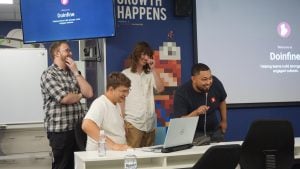4 in-demand jobs in South Africa – and the ‘non-traditional’ skills companies are now looking for when hiring

Emerging technologies such as artificial intelligence and automation are rapidly changing the business landscape, and cyber security and cloud migration are more urgent than ever.
Yet the pool of professionals in this area is limited and employers are struggling to fill the IT skills gap, with demand exceeding supply, says Margaret Pekelaar, head of people in DevOps Practice at Altron Systems Integration.
Pekelaar said the situation is further exacerbated by the rising emigration and remote work arrangements, which means local employers are up against global corporates in the war for talent.
“It’s important for South Africa to grow its own IT skills so that local companies can expand their operations, respond to local conditions, and meet changing customer expectations. Employers are increasingly willing to consider talent with non-traditional backgrounds for IT-related jobs because they recognise that the job market is changing and skills can transfer from one discipline to another,” she said.
Pekelaar said the skills that are the most sought after among IT professionals in South Africa right now include:
- Anything Cloud – This includes Cloud Engineers who are responsible for managing, planning, architecting and monitoring Cloud workloads. Cloud developers, software engineers with a specialisation in cloud computing, and Cloud Migration Engineers with a strong understanding of cloud and infrastructure components are also in strong demand.
- Data Engineers – Data engineers broadly look after an organisation’s data having technical skills that collect, manage and convert raw data into usable formats for analytical or operational purposes
- DevOps Engineers – Responsible for implementing processes and tools to balance needs throughout the software development life cycle from coding to deployment.
- Java Developers – Java is a software language used by many organisations, particularly larger organisations in South Africa and abroad. These are software engineers with the skills to develop IT applications with either a focus on frontend applications or backend services.
Mid-career shift and non-traditional skills
Pekelaar noted that there has also been a trend in South Africa’s IT sector where professionals make a mid-career pivot into completely new roles. This includes employers who are increasingly considering ‘non-traditional’ backgrounds when hiring, she said.
“People who have experience in financial services roles, such as accountants or auditors, who during the course of their original careers work extensively with IT systems develop a good understanding of how IT systems work. People with these backgrounds bring valuable business know-how and experience to complement IT teams.
“Engineers, particularly electronic and industrial engineers who get some exposure to IT Systems at university move from the more traditional engineering careers into fully IT careers.”
She added that careers that have strong analytical skills – financial analysts, lawyers – are typically suitable for IT analyst careers.
“These days technical tools change frequently and are more highly developed so “in-depth” specialisation on technical tools is not always as ‘valuable’ as it was previously.
“The ability to learn and grasp technical concepts quickly, strong analytical ability, the ability to deal with continuous change, and strong communication skills are important EQ skills required in the IT industry. Also, knowledge diversity in teams can be very valuable.”
Read: South Africa to introduce new rules for self-driving cars



















